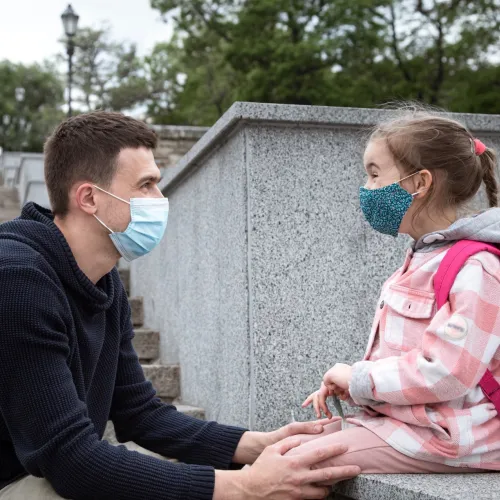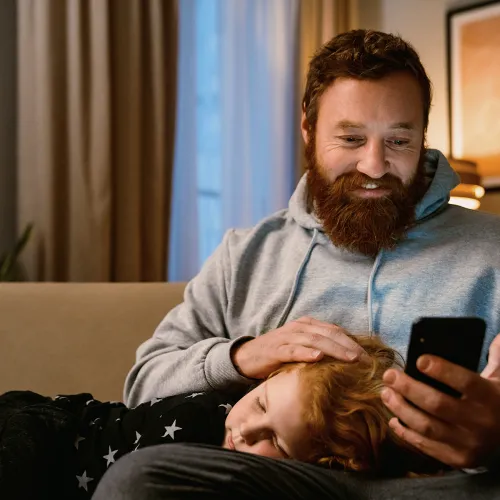Co-parenting when your ex is abusing substances

Divorce or separation can be a difficult experience, especially when you’re trying to re-establish parenting roles with an ex. There are communication difficulties, different priorities, different parenting styles and maybe even different lifestyles.
What do you do when your ex has or is currently struggling with substance abuse issues? How do you manage your emotions and encourage your former partner to get the help they need while still putting the safety and wellbeing of your children first?
It’s important to first understand that substance use and abuse is a spectrum. Substance use could be simply be a few drinks with friends on the weekend or with colleagues after work. But it could also be much more than that.
Substance use can turn into abuse very quickly. Some general signs of use becoming abuse could be drinking more than intended in one sitting or needing increasing amounts of a substance to get the same effect. It can be abuse or dangerous when it starts affecting one’s physical or emotional health, one’s job or relationships, or when legal issues are involved. While as the “ex” we have less influence over what our former partner does, we do have an impact on how it affects our children.
Read on for suggestions for what you can do to manage the impact a co-parent’s substance use has on you and your children.
You can gather more information.
Being direct with your co-parent can be helpful, especially if you are concerned the substance use may be moderate to severe. Starting with questions that have to do with how they have been managing stress or “work/kid/life” balance may give you some information about any possible substance use as a stress management tool. Remember to always keep the children’s safety and comfort as a priority and the primary topic of conversation.
You can suggest they see a professional.
While it’s not the best to tell your co-parent they should see a professional, a professional will be the best person to provide an accurate assessment of your co-parent’s substance use.
You can make suggestions based on your level of concern. There is a wide range of therapies for substance abuse including support groups, individual therapy, outpatient treatment, or inpatient rehab. There are options available to them, and a professional can help guide them when they are ready.
You can set healthy boundaries.
We can have compassion and boundaries with our co-parent. We can understand their struggle and, at the same time, still not feel comfortable or safe exposing ourselves or our children to it. If you are concerned about substance use, you will want to set boundaries on when and how the kids see your co-parent. Maybe it’s a phone call or video chat instead of an in-person visit. Maybe it’s a couple of hours after school or on Saturday mornings.
If you have shared custody of your children, it’s important to consult a family law professional when deciding how to set healthy boundaries. Parenting time and custody agreements should be reassessed when severe substance abuse becomes an issue. A family law professional can discuss the different options you have for modifying your parenting agreement if necessary.
You can educate yourself on addiction and substance abuse.
If your co-parent is in treatment or recovery, you can educate yourself on how to help, or at least helpfully co-exist. You can start therapy on your own, go to meetings and support groups for family members of substance users, or find one of the many resources online to help you navigate through this difficult time.
Recovery is possible.
Co-parenting is possible with a former partner who is in recovery. Gathering more information, direct communication, setting healthy boundaries, taking care of yourself and managing your children’s safety are all ways that you can compassionately provide support. You may not be in an intimate, committed partnership anymore, but you both are committed to parenting your children the best way you can.

Author's Bio:
Dr. Mae Casanova is a Licensed Clinical Psychologist (PSY28763) with a doctoral degree from The Chicago School of Professional Psychology. She has clinical experience in both the private and nonprofit sectors with adolescents, adults, couples, and families at multiple levels of care and in multiple roles. She also provides consulting services from a clinical perspective for startup companies and other professionals in the field. She considers herself a therapist, a growth coach, an objective, insightful colleague, a creator/implementer of systems that work and content that brings people together.
NOTE: Many state and federal laws use terms like ‘custody’ when referring to arrangements regarding parenting time and decision-making for a child. While this has been the case for many years, these are not the only terms currently used to refer to these topics.
Today, many family law practitioners and even laws within certain states use terms such as ‘parenting arrangements’ or ‘parenting responsibility,’ among others, when referring to matters surrounding legal and physical child custody. You will find these terms as well as custody used on the OurFamilyWizard website.








